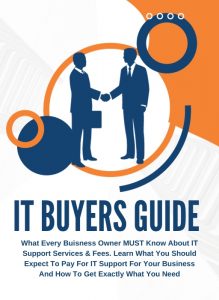
October is almost here, and every year we see the same thing—businesses scrambling to catch up after threats have already spiked. Here’s the real question: if a breach happened tomorrow, could you prove you were ready? The cybersecurity mistakes SMBs make in September often come back to haunt them in October and beyond. But smart business owners are well aware that the weeks leading up to Cybersecurity Awareness Month are when you need to be the most prepared, not the most vulnerable.
Let’s take a look at the five biggest mistakes we see small businesses making right now, and more importantly, how you can fix them before it’s too late.
Mistake 1: Do Hackers Really Target Business Professionals?
This might be the most dangerous myth in the business world today. We can’t tell you how many times we’ve heard, “We’re just a small company. Who would want to hack us?”
Here’s the reality: hackers love small businesses precisely because you’re small. This means you’re easier for them to crack and less likely to have robust security measures in place, yet often every bit as profitable to hit. Phishing attacks and ransomware don’t care if you have 5 employees or 500. That’s why insurers are cracking down—because attackers go after businesses that think they’re “too small” to be worth hacking.
Just last month, we heard from a local accounting firm that thought their small size made them invisible to hackers. One of their employees clicked on what appeared to be an innocent client email, and within hours, their entire system was fully locked down. “We thought it was just spam,” the owner told me, “until it locked our system and started demanding $15,000.”
Mistake 2: What Happens If You Delay Cybersecurity Basics Like MFA and Patching?
Multi-factor authentication, software patching, system updates… These measures aren’t optional anymore, yet we see businesses putting off these basics week after week, month after month.
The cyber risks for SMBs during cybersecurity awareness month spike partly because attackers know that many small businesses are still running on outdated and unpatched systems. Plus, Windows 10 support ends on October 14, 2025. That’s just weeks away!
Insurers already view outdated systems as negligence, and it’s one of the fastest ways to get your claim denied.
If your system was compromised tomorrow because of an old security patch you never bothered to install, how would you explain that to your customers? Or your insurance company?
Mistake 3: How Can You Tell If Your Data Is Already on the Dark Web?
Most businesses have no idea that their credentials are already up for sale on the dark web. This is one of the most common cybersecurity mistakes for small business owners; they just assume that if they haven’t been notified, it must mean they haven’t been breached.
You wouldn’t go into Q4 without checking your books, so why would you ignore your security exposure?
Here’s what typically shows up when we run dark web scans for businesses in Weare:
- Employee passwords from past breaches
- Email addresses linked to compromised accounts
- Customer data that has been circulating for months
- Login credentials for services that the business forgot it even used
The scariest part is that most of this information is just sitting there, waiting for someone to use it against you. One local business only found out their CFO’s email was on the dark web after attackers used it to launch a wire fraud scam.
Mistake 4: Why Does Employee Training Matter for Cybersecurity?
One wrong click could end up costing you thousands of dollars and months of headaches. Yet many businesses either skip employee cybersecurity training entirely, or they did it once two years ago and think they’re still covered.
Your team needs regular cyber awareness refreshers. This can take just minutes, and it can save you everything. New phishing techniques are constantly popping up, and attackers are getting smarter every day when it comes to making their emails look legitimate.
Consider this: your best employee, the one you trust the most, gets an email that looks like it’s from you asking them to update payroll information. Their job is to help, so they click. Game over.
That single click can wipe out months of revenue, and insurers now specifically ask about your employee training records before they’ll approve coverage.
Mistake 5: Why Is an Incident Response Plan Critical for Business Professionals?
If your business got hit with a cyberattack tomorrow morning, what would you actually do?
Most businesses we talk to in Weare do not have any type of incident response plan. They’re hoping nothing happens, but they have no strategy for when something does. Companies without a plan lose more time, more money, and more customer trust when incidents happen.
Having a plan doesn’t just help you respond faster; it often means the difference between staying in business and shutting down forever. Without one, insurers assume you’re unprepared—and they’ll use that to hike your premiums or deny coverage.
Don’t Make These Cybersecurity Mistakes SMBs Make Every Year
For businesses in Weare, staying ahead with solid cybersecurity measures isn’t just smart; it’s essential for surviving in today’s threat environment. The good news is that most of these mistakes can be fixed, and you don’t need a huge budget or a technical degree to address them.
Start with the smartest first step: download our complimentary Cybersecurity Toolkit. Inside, you’ll get a Policy Comparison Guide, smart broker questions, and a Cyber Risk Checklist to help you spot and fix gaps before October. Hackers won’t wait—why should you?
The truth about cybersecurity mistakes? They’re only mistakes if you fix them in time. October is coming whether you’re ready or not. The question is, will you be ahead of the curve or scrambling when it matters most? Are you ready to find out what’s already tied to your business online? Schedule a Cybersecurity Readiness Assessment today, and we’ll run a dark web scan on your domain to show exactly what attackers could already be using against you.




